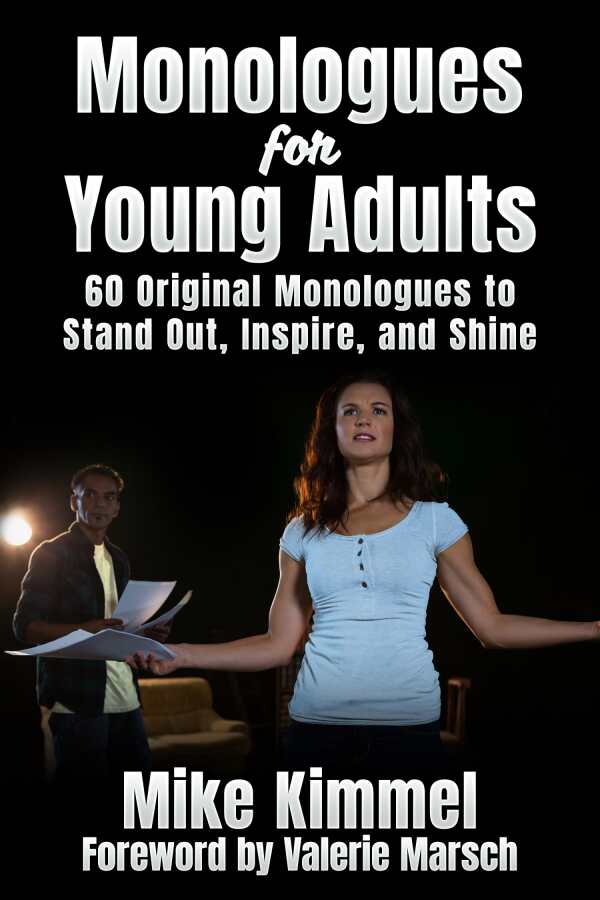Monologues for Young Adults
60 Original Monologues to Stand Out, Inspire, and Shine
Monologues for Young Adults challenges fledgling actors to imagine alternative ways of breathing a sense of freshness, wonderment, and vitality into their performances.
Mike Kimmel’s Monologues for Young Adults is a practical workbook filled with short monologues for recitation by developing actors.
The book takes as its premise that there is a prevailing inclination in theater toward dark, depressing material for monologues. It asserts that this trend is detrimental to the well-being of young actors and their careers. As an alternative, it shares a collection of “family friendly” material with an “optimistic spin.”
The monologues themselves tend to be didactic in nature. They are direct about proffering advice for achieving self-reliance, self-improvement, and intellectual individualism. Some cite Tony Robbins, George Washington, and Albert Einstein—inspirational thinkers whose words support the book’s philosophies. In aggregate, the monologues create an impression of a modern stoic who avows defiance even to the point of risking stubbornness and contempt.
As a workbook, Monologues for Young Adults presents actors with an unusual challenge: it is explicit in eschewing clear dramatic setups. “Don’t let people pull you into your drama,” one monologue instructs. Indeed, few of the pieces include even hints of dramatic tension—which traditionally underpins impactful theater performances.
Rather, these monologues place the impetus on the actor, whom they challenge to fill in the unwritten dramatic context. Indeed, the book instructs performing actors to “dig even deeper. To pretend that your monologue is part of a full-length script.” Still, the result is a gathering of pieces with limited literary scope that represent only dim possible impressions of their characters or stories—even as they allow for vast freedom of expression and discovery in the hands of committed actors who are willing to do such work.
Further, many of the monologues handle abstract concepts in general, non-narrative terms. In the rare instances when specific characters or situational conflicts are invoked, they end up being in the service of illustrating larger morals or principles for the speaker to impart. In “Birds in My Brain,” for instance, a speaker recounts how their father told them they would never achieve artistic success, leading to the timeworn, inevitable conclusion that, in spite of what anyone tells you, you must always follow your dreams. In other pieces, these same ready-made abstractions stem from the language itself. The monologues include commentary on the thoughts and behaviors of “lots” or “most” people or the ways people “always” behave. The speakers of these monologues, as a result, appear curmudgeonly and ungenerous, even in their self-professed optimism. While this kind of characterological irony could make for good theater rife with tension, it also precludes dynamic expression. In the end, the book’s central philosophical principles, rather than developing gradually and organically in a prospective speaker’s voice, arrive in stasis, ossified in their crystalline forms.
In rejecting drama’s usual proclivity for conflict, Monologues for Young Adults challenges fledgling actors to imagine alternative ways of breathing a sense of freshness, wonderment, and vitality into their performances.
Reviewed by
Anthony Hamilton
Disclosure: This article is not an endorsement, but a review. The publisher of this book provided free copies of the book and paid a small fee to have their book reviewed by a professional reviewer. Foreword Reviews and Clarion Reviews make no guarantee that the publisher will receive a positive review. Foreword Magazine, Inc. is disclosing this in accordance with the Federal Trade Commission’s 16 CFR, Part 255.

